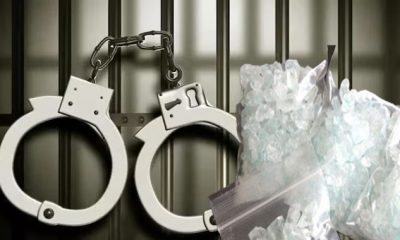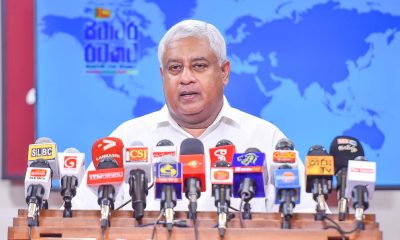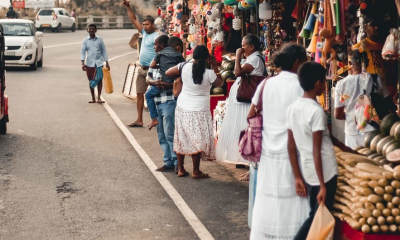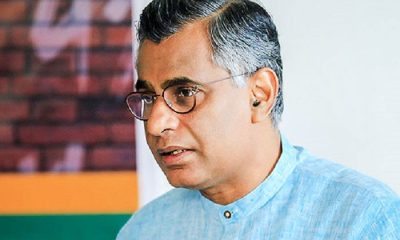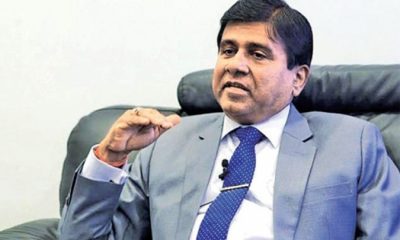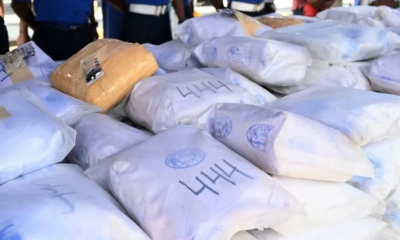Editorial
Sever maritime arm of Drug Mafia

Saturday 6th January, 2024
The ongoing nationwide drug bust, called Yukthiya or Justice, continues to yield sizeable quantities of narcotics daily, and the drug distribution networks have reportedly suffered major setbacks. Many substance-dependent individuals are said to be going through the agony of withdrawal, which, in some cases, could be so intense as to drive the sufferers to suicide. The police are said to be sending them to rehabilitation centres.
Operation Yukthiya must go on until its goal is achieved. The country must be rid of the drug menace, and narcotics dealers who prey on the youth and children must be hunted down. Let that be the bottom line. The police deserve public assistance although the ongoing operation is not totally devoid of politics. They have already drawn severe criticism even from those who have welcomed action being taken to cleanse the country of narcotics and crimes.
Among its critics is former Minister Champika Ranawaka, who has said children become destitute when their parents are arrested and remanded over drug-related offences. The police also stand accused of committing excesses in the name of neutralising the drug Mafia; the recent demolition of a hotel believed to have been constructed with drug money is a case in point.
All unauthorised constructions on beaches and other environmentally-sensitive areas such as wetlands, river banks, forests and the catchment zones of irrigation tanks, have to be pulled down. But those who carry out this task have to act impartially and fairly; no room must be left for selectivity and discrimination.
The police had better tread cautiously lest their lapses and excesses should be leveraged by the opponents of the ongoing offensive against the underworld to turn public opinion against them. It is hoped that the police will care to make appropriate guardianship arrangements for the benefit of the children whose parents are arrested.
It behoves the police to be responsive to criticism and mend their ways. That is the best way to silence their critics and ensure the continuity of Operation Yukthiya. Drug barons have huge slush funds, which can be utilised to carry out social media offensives against the drug busters and influence politicians, who do not scruple to serve the interests of anti-social elements.
As we argued in a previous editorial comment, the on-gong land-based drug eradication campaign has to be coupled with naval operations against drug smugglers’ maritime arm. There is irrefutable evidence that drug dealers use local fishing craft, especially trawlers, to smuggle in narcotics. Bloody turf wars among the owners of drug-smuggling vessels are frequent, and some of them have lasted for decades, especially along the southern littoral.
On Thursday night, the Navy and the Police Narcotics Bureau, in a joint operation, seized a huge stock of heroin and crystal methamphetamine commonly known as ICE, weighing about 300 kilos. It was concealed in a multi-day fishing craft. Six suspects were taken into custody. The vessel was brought to the Galle Port yesterday. In 2023 alone, the Sri Lanka Navy seized 715 kilos of heroin, 11 kilos of ICE, 140 kilos of hashish, 3,711 kilos of Kerala cannabis and 50 kilos of locally-grown cannabis.
This shows that the government has to intensify its focus on the sea routes used by drug smugglers while battling the narcotics dealers on the land. There is a pressing need to surveil all fishing craft and fisheries harbours. All necessary resources, including personnel, must be made available to the Navy, the Coast Guard and the police to step up anti-narcotics operations at sea and on beaches.
That will be half the battle in breaking the back of the drug problem. The general consensus is that most of the narcotics brought into the country through the Colombo Port go undetected due to corruption among politicians, port workers and the Customs personnel. If action is taken to ensure that each and every freight container is properly checked before being released, drug smuggling can be tackled effectively.
Editorial
A dirty political war

Tuesday 13th January, 2026
What began as a debate on the government’s education reforms has descended into a dirty political war, with the propaganda brigades of both the JVP/NPP and the Opposition carrying out vilification campaigns against the key figures in the rival camps. Prime Minister Dr. Harini Amarasuriya, who is also the Minister of Education, has become a victim of a savage character assassination campaign, which no reasonable person will hesitate to condemn unreservedly. Shame on those who have stooped so low as to carry out personal attacks on her!
What has led to the current dispute in the education sector is basically the government’s intransigence. While claiming to be willing to consider dissenting views, it is all out to shove its reform package down the throats of other key stakeholders who unfortunately want the baby also thrown out with the bathwater, so to speak. A prerequisite for resolving the current conflict, which has the potential to cripple the education sector, is for both warring parties to soften their stands and negotiate.
President Anura Kumara Dissanayake is scheduled to meet the representatives of the trade unions representing teachers and principals shortly, we are told. One can only hope that two sides will move towards a rapprochement, which is the need of the hour.
The government ought to stop cherishing the delusion that its mandate is carte blanche for it to do as it pleases with no heed for dissent. It is only wishful thinking that the government will be able to ensure the implementation of its education reforms without the fullest cooperation of the frontline stakeholders—school teachers and principals.
Even the staunchest opponents of the education reforms at issue agree that the education system has to be reformed. What they are opposing tooth and nail is the manner in which the government has set about the task of introducing education reforms and its attempts to impose a fait accompli on other key stakeholders. The Opposition is not without a political agenda where its campaign against the education reforms is concerned; it will go to any extent to gain political mileage.
The government has erred by compressing the process of formulating education reforms into a year or so and proceeding at a pell-mell pace to implement them. Teachers’ and principals’ trade unions are of the view that some modules were prepared in just three months.
By rushing to reform the education sector, the government has provided the Opposition with a fresh rallying point and the latter is making the most of it. Various associations have sprung up overnight purportedly to ‘save free education’, and some Opposition politicians are planning to launch fasts against the education reforms.
A collective of Opposition parties held a protest in Matugama, the other day, claiming to safeguard free education. A group of NPP supporters staged a demonstration in the same township against the malicious propaganda attacks on Prime Minister Amarasuriya. They vehemently condemned the Opposition for insulting women. Their message must have struck a responsive chord with the public regardless what the Opposition politicians and their propaganda hitmen may say about them. Worryingly, the female JVP/NPP supporters have remained silent on scurrilous attacks the pro-government propagandists carry out on women in the Opposition; they have launched a vilification campaign against a young woman who spoke at a joint Opposition rally at Nugegoda recently. Politicians and propagandists in both the government and the Opposition must do unto others as they would have others do unto them.
Since all stakeholders agree that the education system needs reform, the government should put its controversial reform package on hold immediately and invite teachers, principals, the Opposition and others to a serious discussion.
The government would do well to refrain from crossing the Rubicon and be flexible enough to listen to the other stakeholders and make a course correction. It is hoped that the focus of the talks to be held between the government and the opponents of the education reforms will be on how to retain the baby while throwing away the bathwater.
Editorial
Coal and crooks

Monday 12th January, 2026
Corruption has eaten into the vitals of Sri Lanka’s power and energy sectors to such an extent that one wonders whether ‘C’ in the initialisms of the Ceylon Electricity Board (CEB) and the Ceylon Petroleum Corporation (CPC) stands for ‘Corrupt’. Pressure is mounting on the government to cancel a questionable coal tender which is causing staggering losses to the state.
We reported on the coal scam at issue about three months ago, turning the spotlight on the fraudulent procurement of substandard coal. Following our report, the Opposition and the anti-corruption outfits did their own investigations and unearthed more information about the questionable deal. It has been revealed that the government extended the closing date for bidding and changed the eligibility criteria for the bidders in favour of a company of its choice. The company that won the tender has a history of supplying low-quality goods to Sathosa, and its owner and local agent are reportedly under a cloud. A complaint has been lodged with the Commission to Investigate Allegations of Bribery or Corruption (CIABOC) against Minister of Energy Kumara Jayakody over alleged misappropriation of state funds when he was in the Fertiliser Corporation. It is against this backdrop that the coal scam in question should be viewed.
The Opposition took up the issue of substandard coal imports, in Parliament, last week, accusing the NPP government of trying to cover up the scam. SLPP MP D.V. Chanaka told the House that only 107 metric tonnes of coal were usually required per hour to generate 300 megawatts of electricity but now 120 metric tonnes of newly imported coal had to be burnt to produce the same amount of power. About 13 extra tonnes of coal are required per hour due to the scam, according to Chanaka, who also said tests conducted at the Lakvijaya Coal Power Plant had revealed that the calorific value of the first two newly imported coal shipments ranged from 5,600 and 5,800 kilocalories per kilogram (kcal/kg). But under the coal tender guidelines, the minimum required calorific value was 5,900 kcal/kg. Energy Minister Kumar Jayakody is reported to have said the Lakvijaya laboratory is not an accredited facility, and therefore its test results are not acceptable; action will be taken when the test report from an accredited laboratory is received.
Curiously, the government has questioned the integrity of tests conducted by a Sri Lankan laboratory that has tested coal shipments all these years to ascertain their quality. How come the NPP government has suddenly refused to accept the accuracy of the tests conducted by this lab? Is it trying to go on testing the substandard coal until it gets the result it wants so that it can continue to import low-quality coal and help its members line their pockets? In fact, there is no need for any laboratory testing to prove that there is something terribly wrong with the coal procured under the current dispensation; that is clearly borne out by the fact that it takes 120 tonnes of newly imported coal to produce a particular amount of electricity previously generated with only 107 tonnes of standard of coal.
The NPP government seems to have taken a leaf out of the book of the previous administration, which became a metaphor for corruption. It too resorts to dilatory tactics and obfuscation to cover up scams. It has succeeded in diverting the public’s attention from the Ondansetron scam by claiming that more tests need to be conducted; the Opposition, the media, and civil society organisations have forgotten that pharmaceutical racket for all intents and purposes. It is using the same modus operandi in the case of the coal scam. Anti-corruption campaigners must remain intensely focused on all questionable deals and monitor the progress in investigations into them. It was their vigilance and relentless campaigning that led to the arrest and prosecution of Minister Keheliya Rambukwella and some panjandrums over the procurement of a fake cancer drug.
Given the sheer number of corrupt deals and shameful attempts to cover them up, under the incumbent government, which came to power, vowing to eliminate corruption and usher in good governance, one may say, with apologies to Immanuel Kant, out of such crooked wood as that which politicians and officials are made of, nothing straight can be fashioned.
Editorial
Govt. set to burn bridges

Trade unions and professional associations have been cranking up pressure on the NPP government to put its education reforms on hold and invite all key stakeholders to a serious discussion. Prime Minister Dr. Harini Amarasuriya struck a conciliatory note in Parliament the other day, indicating that the government was willing to take dissenting views on board. But President Anura Kumara Dissanayake has said in no uncertain terms that the government will go ahead with its education reform programme. Speaking at the launch of the Rebuilding Sri Lanka project yesterday, he made his government’s position on education reforms clear. The university teachers who naively sought President Dissanayake’s intervention to have the education reforms halted must be disillusioned.
Arguments against the education reforms, particularly the recently created modules, are tenable. Teachers and principals have highlighted serious flaws in them, and the government is trying piecemeal remedies such as removing pages containing errors. Some modules have already found their way into the hands of private tutors, according to teachers’ unions.
Prime Minister Amarasuriya met the Mahnayake Theras in Kandy on Thursday and briefed them on the government’s education reforms and related issues. The prelates expressed their concerns, and requested the government to resolve the issues other stakeholders had flagged. Addressing the media subsequently in Kandy, the PM put a bold face on the situation and sought to make light of the no-confidence motion the Opposition is planning to move against her. Claiming that her political rivals’ efforts had no chance of succeeding, she said a debate on the no-confidence motion against her would provide the government with an opportunity to elaborate on its education reforms. However, it is the Opposition parties that usually gain propaganda mileage in debates on no-confidence motions. The beleaguered SLPP government also defeated no-confidence motions against its members in the last Parliament, but could not prevent public opinion from turning against it.
There is no gainsaying that religious leaders should be kept informed of reforms in vital sectors such as education, but what matters most in implementing education reforms is not their support or blessings however important and valuable they may be. The government should make a serious effort to enlist the support of teachers and principals if it is to achieve its goal of reforming the education system properly. They are the frontline stakeholders who interact with students and perform core operational tasks.
Teachers and principals are on the warpath, insisting that the education reforms are ill-conceived and flawed and therefore they cannot implement them. The government must heed their voice and make a course correction. Most of all, it must ensure that all schools are provided with necessary facilities, such as smart boards. Parents must not be made to pay for them. General Secretary of the Ceylon Teachers’ Union Joseph Stalin has said some schools are already collecting money to buy smart boards, etc. The government is testing the public’s patience.
Doomed is a government that succumbs to hubris. Workers’ Struggle Centre Secretary Duminda Nagamuwa has likened the NPP government’s education reform package to the organic fertiliser drive of the Gotabaya Rajapaksa administration, which tried to bulldoze its way through and drove the public to stage an uprising. Gotabaya secured 52.24% of the total number of valid votes in the 2019 presidential election, and the SLPP mustered a two-thirds majority the following year. He and his party did not heed public opinion and views of independent experts, whom they considered enemies, and committed political hara-kiri.
Overwhelmingly dominant governments become complacent and unresponsive to dissenting views, and this is known as the supermajority syndrome, which has affected five governments led by the SLFP, the UNP, the SLPP and the JVP since 1970. It will be a mistake for the NPP administration to cross the Rubicon in its efforts to railroad key stakeholders into accepting its education reforms.
-

 News3 days ago
News3 days agoSajith: Ashoka Chakra replaces Dharmachakra in Buddhism textbook
-

 Business3 days ago
Business3 days agoDialog and UnionPay International Join Forces to Elevate Sri Lanka’s Digital Payment Landscape
-

 Features3 days ago
Features3 days agoThe Paradox of Trump Power: Contested Authoritarian at Home, Uncontested Bully Abroad
-

 Features3 days ago
Features3 days agoSubject:Whatever happened to (my) three million dollars?
-

 News3 days ago
News3 days agoLevel I landslide early warnings issued to the Districts of Badulla, Kandy, Matale and Nuwara-Eliya extended
-

 News3 days ago
News3 days agoNational Communication Programme for Child Health Promotion (SBCC) has been launched. – PM
-

 News3 days ago
News3 days ago65 withdrawn cases re-filed by Govt, PM tells Parliament
-

 Opinion5 days ago
Opinion5 days agoThe minstrel monk and Rafiki, the old mandrill in The Lion King – II


